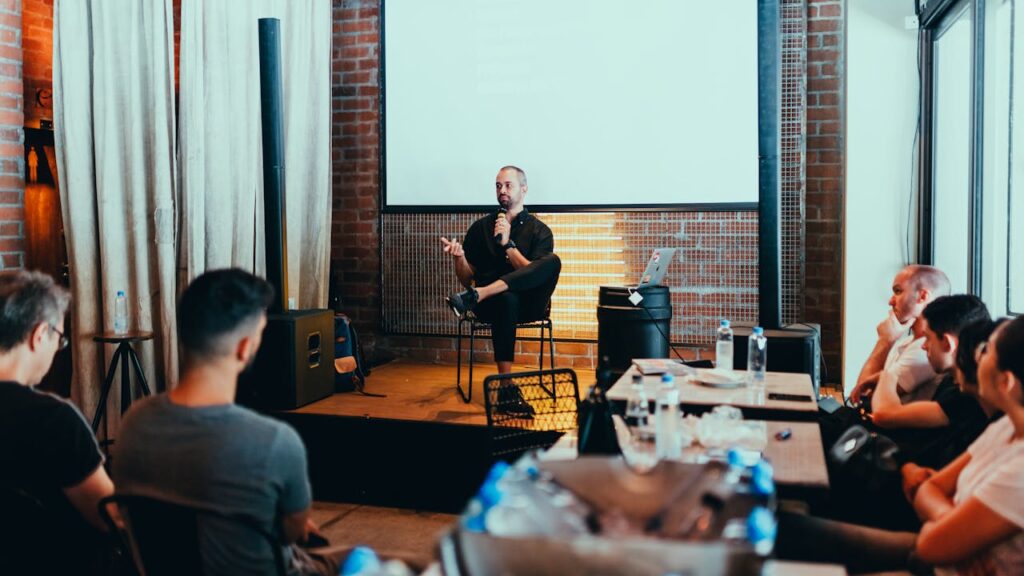
Explore & Play
Discover interesting topics and solve the accompanying crossword puzzle.
Speaker Crossword | Famous speeches that shaped history
Table of Contents
Speaker Crossword
You can either fill in the crossword puzzle directly on this page or click the button in the bottom right corner to print it for free.

The Art of Persuasion: Famous Speeches That Changed the Course of History
Throughout history, there have been moments when the right words, delivered at the right time, have had the power to change the course of nations, inspire movements, and leave a lasting impact on the world. Public speaking is not just about communicating ideas; it’s about persuading, influencing, and motivating others to action. Great speakers possess an ability to tap into the hearts and minds of their audiences, turning mere words into rallying cries for change.
The significance of speeches has never been more evident than in the examples set by historical figures like Winston Churchill, Barack Obama, and Malala Yousafzai. Whether delivering speeches during times of war or advocating for human rights, these individuals have shaped the world with their words.
As we explore these famous speeches, we’ll highlight not only their historical importance but also delve into the tactics that made these leaders so effective in using public speaking as a tool for persuasion. Along the way, you can also engage with a crossword puzzle to test your knowledge about these influential speakers.
Section 1: The Power of Persuasion in Politics
1.1 Political Rhetoric and Its Impact
Political speeches have often been the defining moments of history, guiding nations through times of crisis and change. Leaders have used their words not only to persuade but to unite people toward a common cause. The way in which these speeches are delivered can inspire hope, drive action, and ignite movements that lead to significant political shifts.
Winston Churchill’s speeches during World War II are among the most memorable examples of political persuasion. His “We shall fight on the beaches” speech, delivered in 1940, stirred the British people and rallied them to continue the fight against Nazi Germany despite overwhelming odds. Churchill’s ability to inspire courage and resolve in the face of adversity is a hallmark of great political rhetoric.
Similarly, Barack Obama’s “Yes We Can” campaign speech in 2008 struck a chord with Americans, creating a sense of unity and hope during a time of economic turmoil. His rhetoric brought together diverse groups, motivating them to engage in the political process and believe in the possibility of change.
John F. Kennedy’s inaugural address, where he famously declared, “Ask not what your country can do for you—ask what you can do for your country,” became a defining moment in American politics. His words encouraged citizens to contribute to the greater good, framing public service as an honorable calling.
1.2 Wartime Leadership: Inspiring Nations to Victory
In times of war, speeches have been a critical tool for maintaining morale and inspiring victory. Winston Churchill was not only the British Prime Minister but also a masterful orator whose speeches became a beacon of hope for a nation under siege. His words galvanized the British public, motivating them to endure bombings and setbacks, knowing that victory was possible if they held on.
During World War II, Franklin D. Roosevelt’s famous line, “The only thing we have to fear is fear itself,” delivered in his first inaugural address, reassured Americans during the Great Depression. The speech focused on hope and action, encouraging the nation to confront challenges with confidence and determination.
Ronald Reagan’s speeches during the Cold War played a key role in reshaping the relationship between the United States and the Soviet Union. Reagan’s challenge to Mikhail Gorbachev to “tear down this wall” in 1987 was a defining moment in the battle for freedom, contributing to the eventual fall of the Berlin Wall and the end of the Cold War.
Section 2: Advocating for Equality and Justice
2.1 The Voice of Civil Rights Movements
Some of the most influential speeches in history have been delivered in the name of equality and justice. These speeches have provided a platform for oppressed voices and have sparked movements that led to societal transformation. Martin Luther King Jr.’s “I Have a Dream” speech in 1963 became a defining moment in the American Civil Rights Movement. In this speech, King outlined his vision for a future where all people, regardless of race, would be treated equally. His powerful use of imagery and repetition stirred millions, turning the struggle for civil rights into a national cause.
Malala Yousafzai’s address to the United Nations in 2013 demonstrated the power of a single voice to advocate for global change. Despite surviving a brutal assassination attempt by the Taliban, Malala stood before the world and called for education for every girl, regardless of where they live. Her courage and unwavering commitment to education inspired millions around the globe to join the fight for gender equality.
Another leader who used their voice to advocate for justice was Nelson Mandela. After being released from prison in 1990, Mandela gave a speech calling for peace and unity in South Africa. His words set the tone for the nation’s transition from apartheid to a democracy that embraced equality for all citizens.
2.2 Gender Equality and Women’s Rights
From advocating for women’s rights to challenging patriarchal norms, some speeches have transformed the way society perceives gender equality. Eleanor Roosevelt used her platform to advocate for human rights, delivering speeches that not only focused on women’s issues but also highlighted the need for universal dignity and equality. She became a champion of the United Nations and its mission to promote peace and equality for all.
Julia Gillard’s famous speech on misogyny in Australian politics challenged gender-based discrimination in the workplace and government. Delivered in 2012, her address called out the double standards women face in politics and leadership, making it an iconic moment in the fight for gender equality.
Hillary Clinton, during her 1995 speech at the United Nations in Beijing, declared that “women’s rights are human rights.” This landmark address brought international attention to the issue of women’s rights, encouraging global governments to take concrete actions to eliminate gender inequality.
Section 3: The Role of Public Speaking in Social Change
3.1 The Influence of Humanitarian Leaders
Humanitarian leaders have used speeches to advocate for global change, emphasizing peace, equality, and human rights across borders. Mahatma Gandhi’s speeches during India’s struggle for independence were not only political but deeply moral. His message of non-violence and self-reliance inspired millions to join the independence movement, culminating in India’s freedom from British rule in 1947.
Dalai Lama is another prominent humanitarian leader whose speeches focus on compassion, peace, and understanding. His messages have transcended national borders, offering guidance on how to build a peaceful and harmonious world based on empathy and compassion.
Kofi Annan, as the Secretary-General of the United Nations, gave powerful speeches on issues such as global conflict, poverty, and human rights. His words encouraged nations to work together for peace and justice, leaving a lasting legacy in global diplomacy.
3.2 Empowering the Marginalized: Voices of Resistance
Throughout history, speeches by marginalized groups have played a pivotal role in resistance movements, providing a platform for voices that were often silenced. Aung San Suu Kyi used her speeches to advocate for democracy and human rights in Myanmar, despite facing years of house arrest. Her dedication to peace and freedom inspired a nation and the world.
Lech Wałęsa was the leader of the Polish trade union Solidarity and gave speeches that galvanized workers in Poland, leading to the eventual downfall of communism in Eastern Europe. Wałęsa’s speeches became the foundation for a broader movement of resistance against oppressive regimes.
Juan Manuel Santos, as the President of Colombia, gave speeches urging peace and reconciliation during the Colombian Civil War. His words were instrumental in securing a peace agreement with the Revolutionary Armed Forces of Colombia (FARC), ending decades of violence.
Section 4: The Art of Motivating and Inspiring: Speakers Who Changed Lives
4.1 The Power of Motivation and Self-Improvement
Motivational speakers have an extraordinary ability to inspire and transform lives through their words, helping individuals and organizations reach their fullest potential. Tony Robbins, known for his high-energy motivational speeches, has empowered millions to take control of their lives and achieve their goals. His speeches focus on self-improvement, entrepreneurship, and overcoming obstacles, and they continue to inspire people around the world.
Oprah Winfrey, through her speeches and interviews, has connected with people on a deeply personal level. Her messages of resilience, self-worth, and personal growth have touched millions, making her a figure synonymous with motivation and empowerment.
Steve Jobs’ speeches during Apple product launches were not just about technology; they were about vision. Jobs was able to captivate his audience by inspiring them to see the world in a different way. His speeches helped position Apple as more than a company, but a force for innovation that would change the world.
4.2 Persuasion in Business and Technology
In the world of business and technology, persuasive speeches can rally teams, drive innovation, and shape industries. Steve Jobs was a master at using speeches to not only introduce products but also create a sense of anticipation and excitement. His presentations during Apple keynotes revolutionized the way product launches were perceived.
Bill Clinton, while a politician, often spoke in ways that bridged the gap between business and governance. His speeches emphasized the importance of innovation, economic progress, and global cooperation.
Jens Stoltenberg, as the Secretary-General of NATO, has delivered speeches that not only address security concerns but also foster international collaboration in the areas of technology and defense.
A Lasting Impact: The Enduring Power of Persuasion
The speeches of these influential figures continue to resonate today, demonstrating the timeless power of public speaking to persuade, inspire, and challenge the status quo. From political leaders to humanitarians, motivational speakers to business pioneers, each of these individuals has used their words to influence and change the world.
As we reflect on the enduring power of persuasion, we are reminded that great speeches are not just about eloquent words—they are about the action they inspire. The ability to persuade is not limited to politicians or world leaders; it is a skill that anyone can harness to create change in their own communities and beyond.
Share to...
I hope you enjoy the content.
Want to receive our daily crossword puzzle or article? Subscribe!
You may also be interested in
Share to…
Want to receive our daily crossword puzzle?
-
Jigsaw Puzzles
Art Nouveau Jigsaw Puzzle with Betta Fish in Lush Garden Scene 250 | 300 | 500 Pieces
kr 348,00 – kr 439,00Price range: kr 348,00 through kr 439,00 Select options This product has multiple variants. The options may be chosen on the product page -
Jigsaw Puzzles
Zodiac Ink Dog Puzzle: Artful Elegance 250 | 300 | 500 Pieces
kr 348,00 – kr 439,00Price range: kr 348,00 through kr 439,00 Select options This product has multiple variants. The options may be chosen on the product page -
Jigsaw Puzzles
Nordkapp Abstract Art Jigsaw Puzzle 250 | 300 | 500 Pieces
kr 348,00 – kr 439,00Price range: kr 348,00 through kr 439,00 Select options This product has multiple variants. The options may be chosen on the product page

















